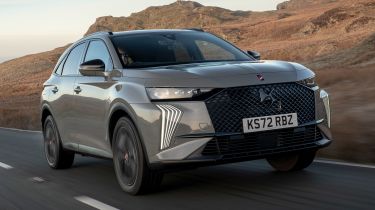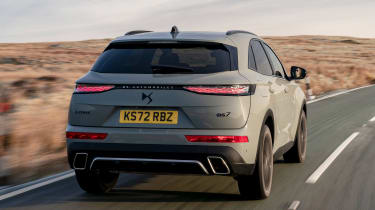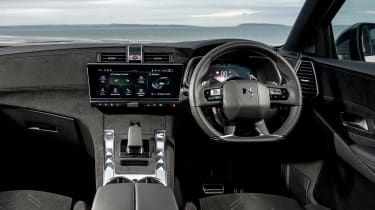New DS 7 E-Tense 360 4x4 2023 review
The DS 7 has lost the Crossback, but have updates made it any better? We find out...

Verdict
The DS 7 is more mainstream than it was before, but misgivings that applied to the previous version of this left-field premium SUV are still present. The sharper styling is almost certain to be more palatable to the typical premium SUV buyer, while the car’s most interesting and strongest aspect - its interior - is thankfully largely unchanged. The driving experience still has its drawbacks though, namely, the inconsistent ride quality that plagued the pre-facelift ‘Crossback’ badged car.
The DS 7 Crossback, as it was then known, was the car tasked with kickstarting a bold new future for the DS brand when it was introduced at the Geneva Motor Show in 2017. Until then, the premium arm of the former PSA Group had subsisted on a mix of cars inherited from Citroen and a handful of Chinese market oddities. But that all changed with this car.
It was the first showcase of what the DS brand could come up with using a clean sheet of paper; a totally new design language, electrification, luxuriously appointed interiors and new technologies unique to DS from the other PSA brands ensured there was plenty to talk about. But, while it certainly nailed its brief of offering up a more experimental, avant-garde alternative to rock-solid German rivals like the Audi Q5, Mercedes GLC and BMW X3, not everything about the somewhat unique entrant into premium family SUV market was positive.
Mid-life facelifts, like the comprehensive one visited on the DS 7 (the Crossback part of the name has now been dropped) provide carmakers with a chance to rectify issues while injecting new style and features. That’s precisely what DS has attempted with this refreshed version of its largest SUV.
Used - available now

2022 Ford
Focus
18,350 milesManualPetrol1.0L
Cash £17,076
2025 Audi
Q2
12,099 milesAutomaticPetrol1.5L
Cash £24,490
2020 Ford
Focus
46,802 milesManualPetrol1.5L
Cash £14,296
2022 Ford
Mustang
35,168 milesAutomaticPetrol5.0L
Cash £32,198The new name really is evidence of a bit of a rethink at the brand. The ‘Crossback’ nomenclature has been made redundant. All models in the range are now named with numbers only, including the smaller DS 3. It’s all part of making the brand more coherent, and better structured.
And with that new structure comes a new look. The DS 7’s nip-tuck takes-in the fresh design ethos debuted by the DS 4 hatchback, boasting a sharper look than before thanks to the larger grille, slimmer LED headlights (with new Pixel LED Vision 3.0 matrix technology) and the new vertical running lights designed as four downward strakes on each side of the grille. A refreshed selection of wheels and paint colours, plus a redesigned tailgate with new badging and taillights complete the makeover.
Inside, things are much more familiar. The DS 7’s always had an eye-catching interior, and it’s impossible to deny that the brand has managed to inject a welcome bit of flair into the cabin of the 7 when German rivals are far more straight-laced. It feels good, too. The materials used in the pre-facelift version were bang up to quality, and that continues here.
The ‘watchstrap’ Nappa leather seats are properly comfortable and well cushioned, and packed with features (heating, ventilation and massage functions, as well as electrically adjustable lumbar) in our range-topping but admittedly expensive La Premiere spec test car The rear bench still reclines electrically, too, a fairly unique function for this segment.
The presentation of things remains as before, but some of the tech is new. The touchscreen system has now been updated to DS’s latest system, known as IRIS. Some smarter organisation of some widgets and information is joined with further personalisation possibilities and new natural language recognition. The 12-inch central display through which the setup is broadcast more or less picks up where it left off in terms of how easy it is to use, but it looks sharper, and more modern. Wireless Apple CarPlay and Android Auto connectivity is bundled, too.
Sitting at the top of the line-up is a new version, more powerful than any car DS has made before. The E-Tense 360 4x4 derivative of the new DS 7 makes use of the car’s familiar 1.6-litre four-cylinder, petrol/dual electric motor plug-in hybrid powertrain, but with more power than ever. 355bhp and 520Nm torque, as well as a larger battery (14.2kWh in size) means 0-62mph in 5.6 seconds, a top speed of 146mph, and an all-electric range of 36 miles in EV mode.
As part of this sportier expression of the DS 7, this version comes with tweaked suspension, too. The dampers have been altered - it rides 15mm lower than other versions of the SUV - while the front and rear tracks are a bit wider - 24mm at the front, and 10mm at the rear.
DS previously marketed the 7 on the basis of its comfort, with its clever camera-based ‘Active Scan’ suspension that can adjust the dampers according to how it reads the road ahead. That tech is still found on the car, but it’s still no better than it was when we first tried it.
It struggles to adjust the suspension with reassuring predictability, the inconsistency of the ride exposed on a road with plenty of variance in the surface condition - just like so many of our roads here in the UK - on which we are driving the car for the first time. Throw in the sportier, firmer suspension setup and the low-profile tyres wrapped around the 21-inch wheels (there to give an imposing stance), and the shortcomings of the DS 7’s setup are quickly exposed.
The powertrain is better. It’s genuinely muscular in its delivery thanks to the torque-rich battery assistance, and thankfully, the suspension’s selections make more sense at speed so you can make the most of the power on offer. Body control is better than you’d expect, and it’s fairly easy to get into the groove on a good road. A BMW X3 beater, it is not, but it’s not completely out of its depth provided you keep your expectations in check.
After comfort? We reckon the 360 4x4 model probably isn’t for you in the first place. A big line-up means two more plug-in hybrid versions and a diesel option, all with ‘regular’ suspension setups, might provide friendlier ride and refinement at a lower price.
| Model: | DS 7 E-Tense 360 4x4 La Premiere |
| Price: | £62,940 |
| Engine: | 1.6-litre 4cyl petrol turbo, x2 e-motors/14.2kWh battery |
| Power/torque: | 355bhp/520Nm |
| Transmission: | Eight-speed automatic, four-wheel-drive |
| 0-62mph: | 5.6 seconds |
| Top speed: | 146mph |
| Economy: | 161.1mpg |
| CO2: | 40g/km |
| On sale: | Now |










